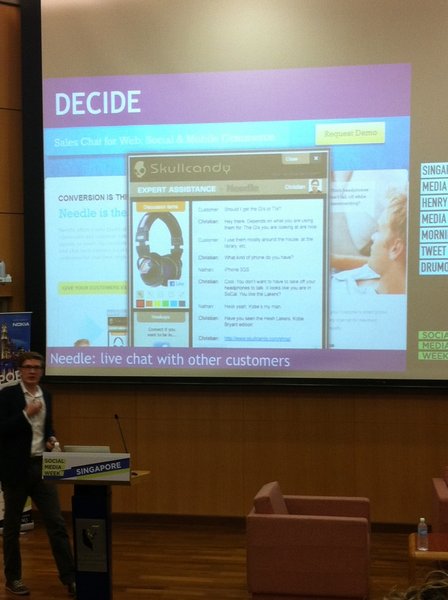This post is part of our coverage for Social Media Week 2012 in Singapore. Click Event Coverage: Social Media Week for full coverage. 11.20am: “In any active consumption, there are two key moments “discover” and “decide”. (Henry Mason)11.32am: “Consumption is now collaborative. Your participation is helping people find relevant products at the right time.”(Henry Mason)11.33am: “Perform or perish. Social media is not about you. It’s about the people.” (Henry Mason) 11.35am: “Even unknown people can help you make a big decision.” Skull Candy’s website acknowledges this with their live product chat. (Henry Mason)11.36am: Web in Travel host discussing social media fatigue with Mason and the audience. Mason says, “social media is not a marketing medium, it’s a communication medium. Communication is very powerful.” Something to think about everytime you get annoyed by celeb endorsements on Twitter.11.39am: Welcoming Alan Soon from Yahoo Southeast Asia to the Social Media Week Singapore Keynote Address.11.40am: Alan Soon addresses two concepts: “news as a product” and “news as a process”. Funny presentation on good ways to present news (as a product): Get a guy who has a symmetrical or really intent face and put him on the screen to make a headline exciting. Or you create a subscription model around one product and make a lot of money out of it.11.44am: “What about ‘news as a process’? This is where we are now. 1. The story never dies. We call these ‘living stories’. Everytime we put a story out there in the world of internet now (and this is what we do at Yahoo), we come back to update it. We go to Twitter and Facebook, and see what people are saying about that story. Then we go back and change headlines, flip it around… 2. News as collaboration. The story is now not just about the journalist but about the community” (Alan Soon)
11.35am: “Even unknown people can help you make a big decision.” Skull Candy’s website acknowledges this with their live product chat. (Henry Mason)11.36am: Web in Travel host discussing social media fatigue with Mason and the audience. Mason says, “social media is not a marketing medium, it’s a communication medium. Communication is very powerful.” Something to think about everytime you get annoyed by celeb endorsements on Twitter.11.39am: Welcoming Alan Soon from Yahoo Southeast Asia to the Social Media Week Singapore Keynote Address.11.40am: Alan Soon addresses two concepts: “news as a product” and “news as a process”. Funny presentation on good ways to present news (as a product): Get a guy who has a symmetrical or really intent face and put him on the screen to make a headline exciting. Or you create a subscription model around one product and make a lot of money out of it.11.44am: “What about ‘news as a process’? This is where we are now. 1. The story never dies. We call these ‘living stories’. Everytime we put a story out there in the world of internet now (and this is what we do at Yahoo), we come back to update it. We go to Twitter and Facebook, and see what people are saying about that story. Then we go back and change headlines, flip it around… 2. News as collaboration. The story is now not just about the journalist but about the community” (Alan Soon)  11.47am: “News is in permanent beta.” “If the news is important, it will find me.” Last week Yahoo installed a new social share feature which tells you what your friends are reading, with the basic assumption that you always want to read what your friends have read. Today, “you read what you are”, not “you are what you read”. (Alan Soon)11.50am: We send out the question, “How do we overcome information overload, both as consumers and and as a brand?” to @alansoon and #smwsg. Let’s see if it gets picked up. (Q&A)11.53am: “You read what you are”, is it a worrying trend that we only share with people who share the same thoughts as us? So no social or cultural diversity?(Q&A)11.56am: Kien Lee from Senatus demands to understand Mason’s concept of not having to use a social media marketing strategy. Mason answers, “When you develop a product and provide a service to always respond promptly to your customers, you quickly develop a communication process with them, which is what is key in social media.” [Q&A]11:59am: “Online, all the magic of touching different bits of paper at the magazine stand, is gone. I hate to sound really negative but we’re all slaves to the information that we know we like. The element of discovery is missing in what we do online.” (Alan Soon)12.01pm: Back to social media marketing strategy not being essential/important. “When does social media become too commercial until people lose interest in it as a social model?”(Q&A)12.04pm: Alan and Henry continue to debate about this issue. Henry says Facebook is an example of brands that don’t use social media to make money. They make money to improve their social media service. Alan Soon is impressed by Gush Cloud and addresses it a few times throughout the session.12.09pm: Privacy and censorship now being addressed. “Twitter has begun censoring its tweets. How do our guests see these curtailing social media?” Alan Soon: Because social media is so influential and capable the government is taking all sorts of interest in it… and sometimes for the wrong reasons.” “I think people know now more than ever what they’ve signed up for, i.e. the privacy issue.” Henry Mason: “It’s going to be almost impossible to truly censor stuff because it’ll go somewhere else in the world, people will read about it.” Alan Soon: “Privacy is often about control and people just want to feel like they have control. It’s only when you don’t know how much control you have that you get upset.” (Q&A)12.16pm: “When can Asia move from imitation to innovation?” Alan: Asia has come up with some fantastic products, and thye just need marketing. And the US is really good at that. A lot of has to do with hype, and not enough marketing.(Q&A)12.19pm: “How do you get consumers to pay for your content?” Alan Soon: There are only three things online consumers are willing to pay for: Porn, Financial Information (stock quotes), Sports.” Henry Mason divulges a little bit on how Trendwatching makes money: “Consumers pay for information on trends (B2B), things that will make them money, and tools and resources to work with that.12.22pm: “We may bring in a Pulitzer winning writer, but if that person does not know SEO (Key theme here being discoverability.), you’re not going to get your content seen.” (Alan Soon)12.23pm: We ask for the mic so we can get our question through. Alan Soon: You need to follow what traditional media have been doing for years… curation. You need to regain a voice of authority, that’s the kind of stuff that you need to do well online. For example, for today’s session, we have a mediator. Henry Mason: “It’s not information overload, it’s ‘filter failure’. There are tools and resources that help you work in that process.. authority filter and feedback from friends.”Read our interviews with the “stars” of Social Media Week, including one with Henry Mason, and other forms of coverage we have from the week-long event on our Event Coverage: Social Media Week Singapore page. –>
11.47am: “News is in permanent beta.” “If the news is important, it will find me.” Last week Yahoo installed a new social share feature which tells you what your friends are reading, with the basic assumption that you always want to read what your friends have read. Today, “you read what you are”, not “you are what you read”. (Alan Soon)11.50am: We send out the question, “How do we overcome information overload, both as consumers and and as a brand?” to @alansoon and #smwsg. Let’s see if it gets picked up. (Q&A)11.53am: “You read what you are”, is it a worrying trend that we only share with people who share the same thoughts as us? So no social or cultural diversity?(Q&A)11.56am: Kien Lee from Senatus demands to understand Mason’s concept of not having to use a social media marketing strategy. Mason answers, “When you develop a product and provide a service to always respond promptly to your customers, you quickly develop a communication process with them, which is what is key in social media.” [Q&A]11:59am: “Online, all the magic of touching different bits of paper at the magazine stand, is gone. I hate to sound really negative but we’re all slaves to the information that we know we like. The element of discovery is missing in what we do online.” (Alan Soon)12.01pm: Back to social media marketing strategy not being essential/important. “When does social media become too commercial until people lose interest in it as a social model?”(Q&A)12.04pm: Alan and Henry continue to debate about this issue. Henry says Facebook is an example of brands that don’t use social media to make money. They make money to improve their social media service. Alan Soon is impressed by Gush Cloud and addresses it a few times throughout the session.12.09pm: Privacy and censorship now being addressed. “Twitter has begun censoring its tweets. How do our guests see these curtailing social media?” Alan Soon: Because social media is so influential and capable the government is taking all sorts of interest in it… and sometimes for the wrong reasons.” “I think people know now more than ever what they’ve signed up for, i.e. the privacy issue.” Henry Mason: “It’s going to be almost impossible to truly censor stuff because it’ll go somewhere else in the world, people will read about it.” Alan Soon: “Privacy is often about control and people just want to feel like they have control. It’s only when you don’t know how much control you have that you get upset.” (Q&A)12.16pm: “When can Asia move from imitation to innovation?” Alan: Asia has come up with some fantastic products, and thye just need marketing. And the US is really good at that. A lot of has to do with hype, and not enough marketing.(Q&A)12.19pm: “How do you get consumers to pay for your content?” Alan Soon: There are only three things online consumers are willing to pay for: Porn, Financial Information (stock quotes), Sports.” Henry Mason divulges a little bit on how Trendwatching makes money: “Consumers pay for information on trends (B2B), things that will make them money, and tools and resources to work with that.12.22pm: “We may bring in a Pulitzer winning writer, but if that person does not know SEO (Key theme here being discoverability.), you’re not going to get your content seen.” (Alan Soon)12.23pm: We ask for the mic so we can get our question through. Alan Soon: You need to follow what traditional media have been doing for years… curation. You need to regain a voice of authority, that’s the kind of stuff that you need to do well online. For example, for today’s session, we have a mediator. Henry Mason: “It’s not information overload, it’s ‘filter failure’. There are tools and resources that help you work in that process.. authority filter and feedback from friends.”Read our interviews with the “stars” of Social Media Week, including one with Henry Mason, and other forms of coverage we have from the week-long event on our Event Coverage: Social Media Week Singapore page. –>





